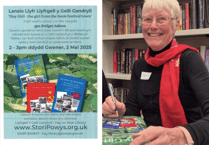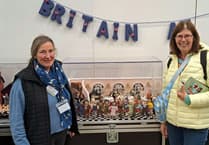A Powys headmaster is celebrating the release of his book about education, and reflecting on the current climate of education in the UK.
Harry Young moved to Builth Wells in 1980 after becoming the headmaster of a primary school in the area. He stayed in the role for 21 years, bringing his wealth of experience in the role of teacher.
"I started my teaching career in 1964 as a science teacher in a secondary school in Newport," Harry says. "After several years I moved to Wiltshire and became a primary school teacher. After several years I rose to the position of Deputy Head in a school of 500 children where I remained until in 1980 I returned to Wales as a headteacher of a new area primary school."
Now, Harry has taken the time to write a book about his upbringing in a Welsh mining town, but also education.
His books, titled 'Valley Boy' and 'Education is not Rocket Science' are available on Amazon, and have garnered good reviews. Education is not Rocket Science is described as being an 'insightful' book that unveils the experiences of a young man from the South Wales valleys, born into a coal mining family, who became a trailblazer. Harry was the first in his family to venture into a teaching position.
"There is no mystique to teaching. All children need to be taught to be literate and numerate and then allowed to practise these skills in a wider context of the environments where they live," Harry says.
He reflects on the rising use of AI and how educators are responding to the rise of AI-generated coursework. "IT and AI, if we are not careful, will take over basic communication and interaction between children which is vital to the development of children and lead to isolation
"Children need to find out for themselves in a practical way where they are the drivers of the learning process and not by way of the press of a computer key giving short-term memory slots quickly forgotten."
He recalls his life of adventure and how that shaped his own teaching methods.
"Life growing up in a mining village was hard for everyone, but as a child, you made your own enjoyment by making things out of bits and bobs to entertain yourself," Harry says. "Homemade slings from tree branches and broken rubber inner tubes from bikes. Homemade sledges from bits of wood, homemade kites from branches covered in newspaper and glued down with flour and water paste. Our playgrounds were the back lanes behind our houses and the mountainside. No tele, only the radio. Life was full of adventure. We experimented. We made things and made things better by trial and error."
He worries that this spirit has been lost in the modern world. "There does not seem to be the time or opportunity or encouragement for children to do any of these activities today.
"This was combined with the rigour of learning your time's table, or writing in your hand were important. This is where the spell checker on the computer and the computer game teaching basic science concepts instead of children making and doing for themselves is lost. Yes we must move on, but not make life so reliant on the next whizz-bang computer game to think for us.
"It is a sad reflection on life when all you see is the latest iPhone dictating every minute leading to further isolation of children. Children need to be encouraged to make, do and experiment. This is the only way to preserve what is important in the development of young children and the future adults of tomorrow.
"As a teacher, this upbringing was the foundation of my philosophy for the teaching of children that is more important than ever."





Comments
This article has no comments yet. Be the first to leave a comment.